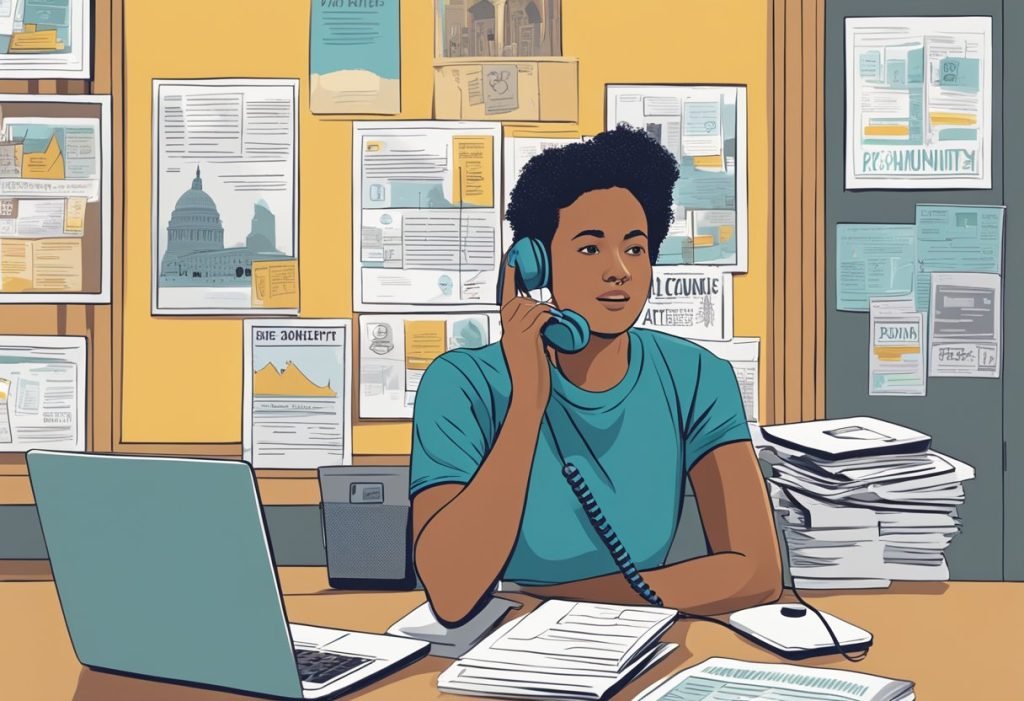Last Updated on March 18, 2024 by Kelvin Nielsen
If you are a tenant, it is essential to know your rights. However, understanding your rights as a tenant can be challenging, especially when dealing with complicated legal jargon.
Fortunately, there are resources available to help tenants understand their rights and address any issues they may face.
A tenant rights hotline is a phone service that provides information and assistance to tenants. These hotlines are staffed by professionals who are knowledgeable about tenant rights and can answer questions about issues such as lease agreements, security deposits, and eviction procedures.
If you are facing a problem with your landlord or property manager, a tenant rights hotline can be an invaluable resource. These hotlines can provide you with the information you need to take action and protect your rights.
Whether you are dealing with a dispute over rent, maintenance issues, or other problems, a tenant rights hotline can help you navigate the situation and ensure that your rights are protected.
Understanding Tenant Rights
As a tenant, it’s important to understand your legal rights and responsibilities. Knowing your rights will help you protect yourself against discrimination and other forms of unfair treatment. Here are some key things to keep in mind:
Legal Foundations
Tenant rights are established by state and federal law. These laws set out the basic rights and responsibilities of tenants and landlords. They cover everything from rent payments to eviction procedures. If you have questions about your legal rights as a tenant, you should seek legal advice from a qualified attorney.
Rights and Responsibilities
As a tenant, you have the right to a safe and habitable living environment. This means that your landlord is responsible for maintaining the property in good condition and making necessary repairs. You also have the right to privacy and to be free from discrimination based on your race, gender, religion, or immigration status.
At the same time, you have certain responsibilities as a tenant. You are responsible for paying rent on time and for keeping the property in good condition. You must also comply with any rules or regulations set out by your landlord or the local housing authority.
Protection Against Discrimination
Under the Fair Housing Act, it is illegal for landlords to discriminate against tenants based on their race, gender, religion, or immigration status. If you believe that you have been the victim of discrimination, you should contact your local fair housing agency or seek legal advice from a qualified attorney.
Remember, knowing your rights as a tenant is the first step in protecting yourself from unfair treatment. If you have questions about your legal rights or need help resolving a dispute with your landlord, seek legal advice from a qualified attorney or contact a tenant rights hotline such as Tenants Together or Metropolitan Tenants Organization.
Navigating Landlord-Tenant Relationships
As a tenant, you have certain rights and responsibilities when it comes to your apartment and your landlord.
Lease Agreements
Lease agreements are contracts between landlords and tenants that outline the terms of the tenancy. These terms can include the amount of rent, the length of the lease, and the responsibilities of both the tenant and the landlord.
It is important to read and understand your lease agreement before signing it. If you have any questions or concerns, be sure to ask your landlord before signing.
Security Deposits
When you move into an apartment, your landlord may require you to pay a security deposit. This deposit is meant to cover any damages you may cause to the apartment during your tenancy.
In most states, landlords are required to return your security deposit within a certain amount of time after you move out. If your landlord withholds any portion of your security deposit, they must provide you with an itemized list of deductions.
Repairs and Maintenance
Your landlord is responsible for maintaining your apartment in a habitable condition. This means that they must make necessary repairs to keep the apartment safe and livable.
If you notice any maintenance issues in your apartment, be sure to report them to your landlord in writing as soon as possible. In most cases, your landlord is required to make repairs within a reasonable amount of time.
Eviction Procedures
If your landlord wants to evict you, they must follow certain procedures. In most cases, your landlord must provide you with written notice of the eviction and the reason for it. You may have the opportunity to remedy the situation before the eviction takes place. If you believe that your landlord is evicting you illegally, you may want to seek legal advice.
Remember that as a tenant, you have rights and responsibilities. By understanding these rights and responsibilities, you can navigate the landlord-tenant relationship more effectively. If you have any questions or concerns, don’t hesitate to reach out to a tenant rights hotline for assistance.
Tenant Hotline Services
If you are a tenant and have questions or concerns about your rights, there are several tenant hotline services available to help you.
Types of Assistance
The types of assistance provided by tenant hotlines can vary, but typically include information on landlord-tenant laws, eviction prevention, and renter’s rights. Some hotlines may also offer legal advice or representation for tenants facing eviction or other legal issues related to their housing.
Accessing the Hotline
Accessing a tenant hotline is usually as simple as making a phone call or sending an email. Most hotlines are staffed during regular business hours, but some may offer extended hours or 24/7 availability.
When you call, be prepared to provide basic information about your situation, such as your name, address, and the nature of your issue.
Community Resources
In addition to providing information and referrals, many tenant hotlines also maintain databases of community resources that can help tenants with a variety of issues, from finding affordable housing to accessing food assistance programs.
These resources may include non-profit organizations, government agencies, and other community-based groups that can provide additional support and assistance to tenants in need.
Legal Support and Representation
If you’re a tenant dealing with a housing issue, it’s important to know your legal rights and options. Fortunately, there are several legal support and representation options available to help you navigate the legal system.
Finding Legal Aid
If you’re unable to afford an attorney, legal aid organizations can help provide free or low-cost legal services. These organizations can help with a variety of legal issues, including housing disputes. You can find legal aid organizations in your area by contacting your state’s Attorney General’s office or by searching online.
Pro Bono Services
Pro bono services are provided by attorneys who volunteer their time and services to help those in need. These services can be a great option for tenants who need legal representation but cannot afford to pay for it. You can find pro bono services in your area by contacting your local bar association or by searching online.
Representation in Housing Court
If you’re facing an eviction or other legal dispute related to your housing, it may be necessary to appear in housing court. Having legal representation can be crucial in these situations. You can find attorneys who specialize in housing law by contacting your state’s Attorney General’s office or by searching online.
Remember, it’s important to seek legal help as soon as possible if you’re facing a housing issue. By taking action early, you may be able to avoid more serious legal problems down the road.
Tenant Advocacy and Community Action

As a tenant, you have the right to advocate for your rights and take community action to ensure your housing needs are met. Tenant advocacy groups and community organizations offer a variety of resources and services to empower tenants and support their rights.
Tenant Unions
Tenant unions are groups of tenants who work together to advocate for their rights and improve their living conditions. These unions provide a platform for tenants to voice their concerns and work collaboratively to address issues such as rent increases, eviction, and maintenance problems. By joining a tenant union, you become a member of a community that is dedicated to ensuring that your housing needs are met.
Volunteer Opportunities
Volunteering with tenant advocacy groups and community organizations is a great way to support tenants’ rights and make a positive impact in your community. Many agencies rely on volunteers to provide counseling, advocacy, and other services to tenants. Volunteering can also be a great way to gain experience and develop skills in areas such as advocacy, community organizing, and public speaking.
Legislative Advocacy
Legislative advocacy involves working with lawmakers and government officials to create policies and laws that support tenants’ rights. Tenant advocacy groups and community organizations often engage in legislative advocacy to ensure that tenants’ voices are heard and their needs are met. By participating in legislative advocacy efforts, you can help shape policies and laws that impact your housing rights and the rights of tenants in your community.
Remember, as a tenant, you have the right to advocate for your rights and take community action to ensure your housing needs are met. Whether through joining a tenant union, volunteering with a tenant advocacy group or community organization, or engaging in legislative advocacy efforts, there are many ways to get involved and make a difference.
Educational Resources and Outreach
If you are a tenant looking for information, training, or educational materials on your rights, there are many resources available to you. These resources can help you understand your rights and responsibilities as a tenant, as well as provide you with the tools you need to advocate for yourself.
Workshops and Training
Many organizations offer workshops and training sessions on tenant rights. These sessions are usually free and cover a range of topics, including fair housing laws, eviction prevention, and how to file a complaint with your landlord. Attending these workshops can be a great way to learn about your rights as a tenant and connect with other renters in your community.
Public Awareness Campaigns
Public awareness campaigns are another way that organizations are working to educate tenants about their rights. These campaigns use a variety of media, including social media, billboards, and flyers, to spread information about tenant rights and resources. By raising public awareness about tenant rights, these campaigns can help tenants feel more empowered and connected to their communities.
Educational Materials
There are also many educational materials available for tenants who want to learn more about their rights. These materials can include brochures, pamphlets, and websites that provide information on topics like lease agreements, security deposits, and repairs. Some organizations also offer online courses or webinars that cover more in-depth topics like fair housing laws and eviction prevention.
Overall, there are many resources available to help educate tenants about their rights. Whether you are looking for information, training, or educational materials, there are staff and volunteer counselors who have experience helping tenants navigate the rental process. By taking advantage of these resources, you can become a more informed and empowered tenant.
State and Local Housing Laws
As a tenant, it’s important to understand the state and local housing laws that apply to your situation. These laws can vary depending on where you live, so it’s important to familiarize yourself with the regulations that apply to you.
New York City Regulations
If you live in New York City, there are a number of regulations that apply to your housing situation. For example, the city has a number of affordable housing programs that can help you find a place to live that fits within your budget. Additionally, the city has capacity guidance that limits the number of people who can live in a single apartment.
Statewide Policies
In addition to local regulations, there are also statewide policies that apply to tenants in New York. For example, the state has a number of laws that protect tenants from eviction, including laws that require landlords to provide notice before evicting a tenant.
Local Ordinances
Finally, there may be local ordinances in your area that apply to your housing situation. These ordinances can cover a range of topics, from noise complaints to building codes. It’s important to be aware of these ordinances so that you can comply with them and avoid any potential legal issues.
Handling Rent and Financial Issues
As a tenant, you have certain rights when it comes to rent and financial issues. Here are some important things to keep in mind:
Rent Increases and Controls
Your landlord is allowed to increase your rent, but there are limits to how much they can raise it and how often they can do so. Check your lease agreement for details on rent increases. If you think your landlord is raising your rent unfairly, you can contact the Statewide Tenants’ Rights Hotline for assistance.
Financial Hardship Assistance
If you are experiencing financial hardship and are having trouble paying your rent, there may be assistance available to you. Contact your local rental assistance program to see if you qualify for financial aid. You can also contact the Statewide Tenants’ Rights Hotline for guidance on what to do.
Dealing with Back-Rent
If you fall behind on your rent payments, it’s important to communicate with your landlord and try to work out a payment plan. If you are unable to pay your back-rent, you may face eviction. However, there are legal protections in place to prevent landlords from evicting tenants without due process.
Contact the Statewide Tenants’ Rights Hotline if you need help dealing with back-rent or eviction proceedings.
Resolving Disputes and Filing Complaints
As a tenant, you have certain rights and protections under the law. However, sometimes disputes can arise with your landlord or property management company. If you are facing problems with your landlord or neighbors, there are several ways to resolve the issue.
Mediation Services
Mediation is an effective way to resolve disputes between tenants and landlords. Mediation services are available in many states and can be an affordable and efficient way to resolve disputes. The mediator acts as a neutral third party and helps both parties come to a mutually agreeable solution. If you are facing an eviction case, mediation can help you avoid going to court.
Court Procedures
If mediation does not work, you may need to go to court to resolve your dispute. If you are facing an eviction case, you will need to follow court procedures to protect your rights. It is important to understand the court procedures and deadlines in your state to ensure that you have the best chance of success.
Filing a Complaint
If you believe that your landlord has violated your rights, you may need to file a complaint. Filing a complaint can help you protect your rights and ensure that your landlord is held accountable for their actions. You can file a complaint with your state’s housing authority or with a tenant rights organization. It is important to gather all relevant documentation and evidence to support your complaint.
In conclusion, resolving disputes and filing complaints can be a complex process. However, with the right knowledge and resources, you can protect your rights as a tenant and ensure that your landlord is held accountable for their actions. Remember to always seek legal advice if you are facing a difficult situation.
Frequently Asked Questions
How can I file a complaint against my landlord?
If you feel like your landlord is not fulfilling their obligations, you can file a complaint with your local housing authority. You can also contact a tenant rights hotline in your state for assistance. Provide evidence such as photos, emails, and text messages to support your claim.
What legal steps should I take if I discover mold in my rental property?
If you discover mold in your rental property, you should inform your landlord immediately. If the landlord fails to take action, you can contact your local health department. You may also consider filing a complaint with a tenant rights hotline in your state or consulting with a lawyer.
What are the eviction laws for renters without a lease in Mississippi?
In Mississippi, renters without a lease are considered tenants at will. This means that the landlord can terminate the tenancy by giving the tenant notice to vacate. The notice period depends on the rental agreement or state law. If the tenant fails to vacate, the landlord can file an eviction lawsuit.
How do I contact the Tenant Union in Washington State for assistance?
To contact the Tenant Union in Washington State, you can visit their website at www.tenantsunion.org or call their hotline at (206) 723-0500. They provide free legal advice and assistance to tenants in Washington State.
What are the general rights of tenants under HUD regulations?
Under HUD regulations, tenants have the right to live in safe and decent housing, free from discrimination. They also have the right to receive proper notice before eviction and to challenge any charges deducted from their security deposit. Tenants can file a complaint with HUD if they feel their rights have been violated.
Where can I find information on state-specific landlord-tenant laws?
You can find information on state-specific landlord-tenant laws by contacting a tenant rights hotline in your state or visiting your state’s official website. Many states have specific laws regarding security deposits, eviction notices, and tenant rights that you should be aware of.
Disclosure: The content herein isn’t a substitute for advice from a professional attorney. It’s only meant to serve educational purposes. If you have a specific question, kindly seek expert attorney services.

Hi, I’m Kelvin Nielsen, an experienced landlord and accomplished real estate lawyer. My focus is on answering your questions about renting in the hopes of making your life as a renter or a landlord a bit easier.







